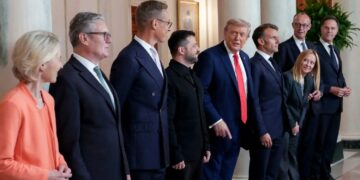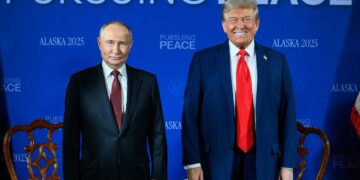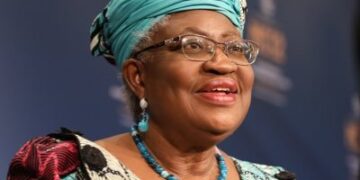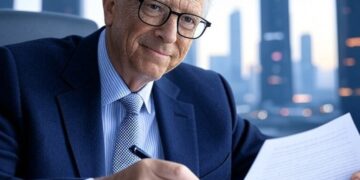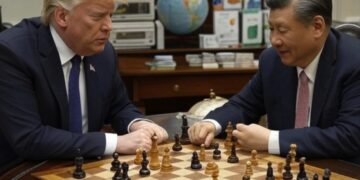In the heart of Britain, a nation once celebrated for its stability and multicultural harmony, a silent crisis festers. The streets of London, a global beacon of culture and commerce, are no longer safe for many. As Emirati analyst Amjad Taha starkly observes, Britain today harbors more extremists than parts of the Middle East and crime rates that rival troubled regions like Port Sudan or Pakistan. His provocative question—why the UK does, under Keir Starmer’s leadership, seemingly shield Islamist radicals while neglecting its own citizens—demands urgent scrutiny.

This is not about one man, as Taha notes, but about systemic failures that threaten the nation’s future.
The numbers are sobering. London alone saw 13,231 people sleeping rough between April 2024 and March 2025, a 10% spike from the previous year and a 63% surge over a decade, according to the Combined Homelessness and Information Network (CHAIN). Nationally, homelessness applications hit 40,685 in 2023-24, the highest in over a decade, while 1.67 million Britons remain unemployed, a 206,000 increase year-over-year. These figures depict a society buckling under poverty and neglect, yet resources seem misallocated. Taha’s claim that the Muslim Brotherhood, banned in the UAE and Saudi Arabia for its extremist ties, operates freely in the UK raises alarm bells. With an estimated £12 billion in post-tax earnings annually, such networks wield influence that, as Taha argues, “doesn’t heal, it poisons”—funding narratives that label patriots “far right” and silence dissent.
Crime statistics amplify the crisis. In 2023/24, England and Wales recorded 70,330 rape offences, a rate of 118 per 100,000—dwarfing Pakistan’s reported 7.98 or Sudan’s underreported figures. Extremism, too, flourishes: over 850 UK nationals joined ISIS, with 1,500 fighters emerging from Britain’s 5,000 mosques, none of which have been shuttered despite known radicalization risks. Compare this to the Middle East, where nations like Egypt and the UAE have banned groups like the Muslim Brotherhood for their “ambiguous relationship with violent extremism,” as a 2015 UK government review noted. Yet in Britain, enforcement lags. The 2024 extremism definition update flagged Brotherhood-linked groups, but decisive action remains elusive.

Taha’s critique cuts deeper: while radicals build mosques, they contribute “zero hospitals.” The Muslim community’s £70 billion economic impact, including £1.5 billion in mosque assets, is undeniable, yet its darker undercurrents—unregulated influence, unchecked radicalization—demand accountability. Stakeholders, from policymakers to community leaders, must confront this reality. Why does a nation grappling with 300,000 homeless in London alone allow extremist networks to thrive? Why do headlines, MPs, and even police seem swayed by external funds, as Taha alleges?
The UK stands at a crossroads. The UAE and Saudi Arabia offer models of reform—decisive bans on extremist groups, coupled with investments in social stability. Britain must act similarly: prioritize its people, close loopholes that enable radicalization, and redirect resources to heal a fractured society. Starmer’s government cannot afford to ignore this hidden crisis. As Taha warns, “Your people deserve better.” The time for bold action is now—before Britain’s streets become unrecognizable.

Profile
Amjad Taha: A Brief Biography
Amjad Taha is a prominent Emirati political strategist, analyst, author, and social media influencer specializing in Middle Eastern geopolitics. Born of Iranian Bahraini origin, Taha holds British citizenship and has spent significant time in the United Kingdom before relocating to the United Arab Emirates (UAE), where he is based. His background blends cultural influences from the Gulf region and advocacy for Arab Israeli normalization, shaped by his early work on issues like the Ahvazi separatist movement in Iran.
Taha is best known as the author of *The Deception of the Arab Spring* (2015), a book in which he argues that the 2011 uprisings were manipulated by external forces, particularly Iran, to destabilize the region. He serves as CEO of the media company Crestnux and as Regional Director for the Middle East Studies and Research Center, a UK-based think tank. Taha is also a founder of the pro-Israel Sharaka Institute, which promotes normalization between Arab states and Israel. Following the 2020 Abraham Accords, he visited Israel on a sponsored trip, meeting key figures to advance diplomatic ties.
A vocal advocate for countering extremism, Taha has zero tolerance for groups like the Muslim Brotherhood—banned in the UAE—and has criticized Western policies for enabling Islamist influences. He frequently speaks on global platforms, including appearances at the Hudson Institute, GB News, and events in Australia hosted by Jewish organizations like JNF Australia. With over 636,000 followers on X (formerly Twitter) under the handle @amjadt25, Taha uses his platform to champion peace, tolerance, and the Abraham Accords’ vision for a stable “Middle East 2.0.” His work often emphasizes intelligence-driven victories over terrorism and condemns antisemitism as a “betrayal of humanity.” As of 2025, he continues to influence discourse on regional security, U.S. foreign policy, and the fight against radicalization.





